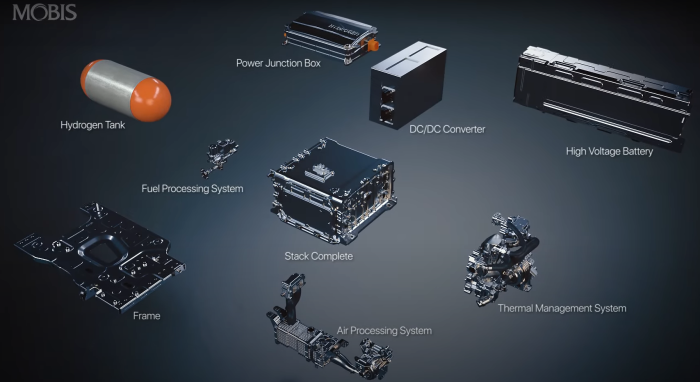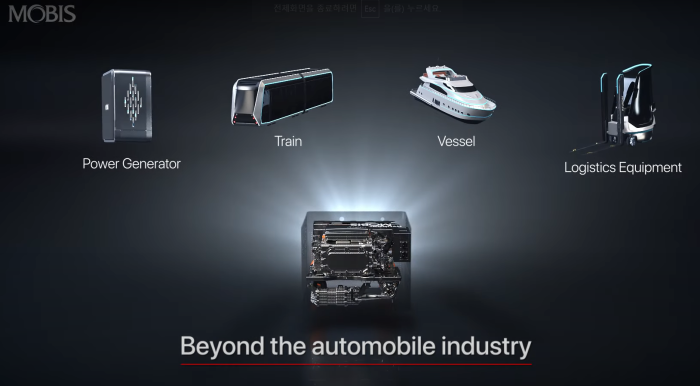Hydrogen economy
Hyundai Mobis to invest $1.1 bn to make hydrogen fuel cells
The investment puts Mobis at the core of the group, responsible for operating the overall hydrogen supply chain
By Aug 20, 2021 (Gmt+09:00)
2
Min read
Most Read
LG Chem to sell water filter business to Glenwood PE for $692 million


KT&G eyes overseas M&A after rejecting activist fund's offer


Mirae Asset to be named Korea Post’s core real estate fund operator


StockX in merger talks with Naver’s online reseller Kream


Meritz backs half of ex-manager’s $210 mn hedge fund



Hyundai Motor Group’s long-term ambition to create a full-fledged hydrogen value chain, from fuel cell production to hydrogen-powered logistics and mobility services, has become more tangible with its auto parts maker Hyundai Mobis Co. at the core.
Hyundai Mobis reported on Aug. 20 that its board members have approved investing 1.32 trillion won ($1.11 billion) to expand hydrogen fuel cell production facilities in the cities of Incheon and Ulsan. The approved amount marks the single largest investment made by the Hyundai Motor Group in the hydrogen sector.
Hyundai Mobis’ Incheon plant will make hydrogen fuel cell stacks, containing up to several hundred fuel cells, which will be made into fuel cell systems at the Ulsan plant. These fuel cell systems will be supplied to Hyundai Motor Co. to be equipped on its fuel cell electric vehicle (FCEV) Nexo as well as XCIENT hydrogen fuel cell trucks.
Hyundai Mobis said that the new funds will significantly ramp up its hydrogen fuel cell production capacity, currently enough for supplying to about 6,000 vehicles per year.
Hyundai Motor Group’s strategic plan by 2030 is to invest a total of 7.6 trillion won ($6.4 billion) in the hydrogen business to be able to secure annual production capacity of 500,000 hydrogen vehicles. The group’s auto unit Hyundai Motor sold a total of 16,767 Nexo vehicles to date and plans to export 1,600 XCIENT trucks by 2025.
MOBIS AT THE CENTER OF THE GROUP’S HYDROGEN SUPPLY CHAIN
Experts note that the trillion-won investment puts Hyundai Mobis at the key position responsible for the overall operation of the group’s hydrogen fuel cell supply chain. In other words, Hyundai Mobis’ cost efficiency, production capacity and technical capabilities in manufacturing hydrogen fuel cells will directly impact the cost structure as well as the mileage performance of Hyundai Motor’s hydrogen vehicles.
Hydrogen fuel cell stacks, which generate power for the vehicles to run, take up to 40% of the manufacturing cost of hydrogen FCEVs.

Hyundai Motor Group highlighted that the global demand for hydrogen fuel cell systems is projected to grow sharply, as the fuel cells are increasingly used by ships, drones, trains as well as office and residential buildings. The management consulting firm McKinsey & Co. projected that the annual global demand for hydrogen fuel cells will grow to 5.5-6.5 million units by 2030.
“With this investment, we will expand the group’s hydrogen ecosystem by setting up a more efficient supply network of fuel cell systems,” said a Hyundai Motor Group official.
Write to Hyung-kyu Kim at khk@hankyung.com
Daniel Cho edited this article.
More to Read
-
 Hydrogen vehiclesCalifornia to deploy 30 Hyundai hydrogen trucks for public projects
Hydrogen vehiclesCalifornia to deploy 30 Hyundai hydrogen trucks for public projectsJul 27, 2021 (Gmt+09:00)
2 Min read -
 Future MobilityHyundai Mobis targets in-vehicle healthcare with brainwave technology
Future MobilityHyundai Mobis targets in-vehicle healthcare with brainwave technologyJul 21, 2021 (Gmt+09:00)
2 Min read -
 Future mobilityHyundai Mobis expands mobility business, reveals concept cars
Future mobilityHyundai Mobis expands mobility business, reveals concept carsApr 01, 2021 (Gmt+09:00)
3 Min read
Comment 0
LOG IN


